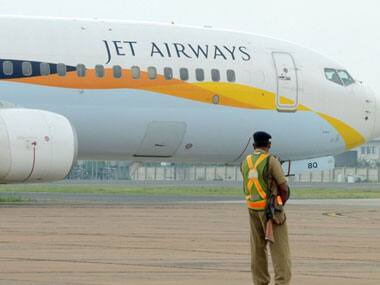Jet Airways is in urgent need of funds from Etihad as lack of inflows has been depleting its balance sheet reserves to dangerous levels and further escalating interest costs.
Analysts now warn that unless the cash bleeding stops and Jet reigns in ballooning costs, it may have to resort to asset sales in future which in turn could threaten its expansion plans. In the second quarter this fiscal, Jet’s operational performance also raised concerns, partly on account of seasonality but also because of promotional fares eating into revenues. So in short, the airline is gasping for funds while costs escalate and passenger traffic growth remains inadequate.
[caption id=“attachment_1209785” align=“alignleft” width=“380”]  Jet Airways is in urgent need of funds from Etihad. AFP. [/caption]
The deal with Etihad will mean offloading 24% equity by Jet’s promoters in return for over Rs 3200 crore funds into the cash starved Jet. Not only is the delay in arrival of these funds a matter of concern, it is now not even certain if this large infusion will even be enough. While declaring the second quarter results recently, the airline had notified stock exchanges about an auditors’ note. Here, auditors have made it clear that its continuation as a “going concern” is dependent on funds it receives from Etihad. Analysts have said negative net worth for Jet Airways stood at Rs 1700 crore at the end of Q2.
The first thing that Etihad’s money will do is provide some relief to Jet on paring its debt and reducing servicing costs. It is also expected to help the airline better negotiate suppliers’ contracts. The deal should be completed in the ongoing quarter as only a clearance from the Competition Commission of India remains. But will it provide adequate working capital cushion and help Jet stem the bleeding? Jet funds subsidiary JetLite’s operations and has acknowledged that JetLite’s networth has become negative, which puts in doubt JetLite’s ability to return the loans provided by Jet Airways. Another reason for Jet to worry.
“While results in part reflect the seasonal weakness, the ongoing delay in fund infusion from Etihad is depleting Jet’s balance sheet reserves as interest costs continue to remain elevated……Unless the cash bleed stops and Jet reigns in ballooning costs, it may have to resort to express asset sales in future threatening their expansion,” Mahantesh Sabarad and Vijay Nara said in a note to clients after Jet’s Q2 results.
Impact Shorts
More ShortsSome highlights of the September quarter performance should explain why Jet is in an unprecedented position:
- Analysts say its domestic margins in the September quarter were the second worst in the last five consecutive quarters at negative 17.3% versus positive 9.3% in the same quarter last year and positive 3.6% in the first quarter of this fiscal.
International operations have been losing their profitability for the last few quarters with margins in Q2 this year the lowest among last five quarters at 10.7%. On a year on year comparison, margins have almost halved.
The decline in margins all round has happened because promotional fares meant sharply lower yields (revenue per passenger) when costs escalated due to fuel rates.
Rashesh Shah and Darpan Thakkar of ICICIDirect point out that with currency volatility subsiding and fuel costs down, the current quarter should see a sharp increase in margins for Jet Airways. They also say that funds from Etihad would be the key positive for Jet going forward. In the analyst conference call earlier, Jet officials had explained that Jet group’s market share rose from 22.7% to 25% during the quarter; system wise seat factor was up to 78.2% against 75% in the same quarter last year and yields were higher by about 15%.
The airline officials also said that debt on its books as of September was $1.9 and the average cost of debt was 5.1% which will come down to 4-4.2% when Etihad money comes in. Funds from Etihad are expected to quickly take care of the $350 million high cost debt. This component of borrowings attracts a high 13% rate of interest and by retiring all of it, the airline will not only substantially reduce its overall interest repayments but also be able to cash on the table for better renegotiation of several contracts with suppliers.
Anyway, at least $1.4 billion of the total debt on Jet’s books is aircraft debt which is backed up by assets (the aircraft) and need not be repaid before term. This only leaves another $350 million which is anyway dollar debt at interest rates of 7-8% and again does not need to be repaid in a hurry.
Jet needs to take drastic measures to keep its bleeding balance sheet from weakening further. Officials said today that a network wide study on fleet and route planning should be completed by October end and should help them plan better on integration of network with Etihad as well as on domestic expansion.


)

)
)
)
)
)
)
)
)



